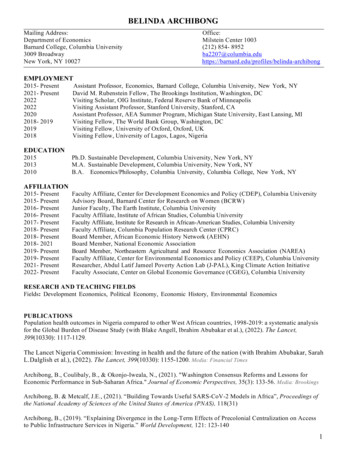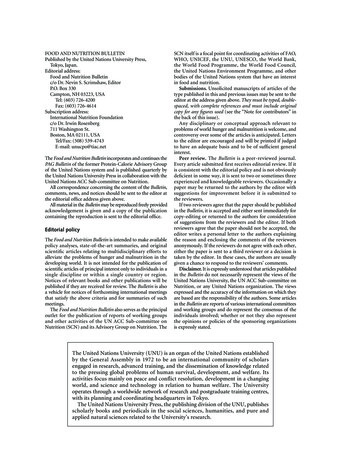
Transcription
Capacity BuildingUNU-EGOV Training Portfolio
A government leader on Information Technology (IT), often called a Government ChiefInformation Officer (GCIO), is responsible for developing and managing IT capabilities withina government organization, strategically aligning such capabilities with existing organizationalobjectives, and leading the organization towards adopting new strategic objectives madepossible by IT. In addition to regular responsibilities of an IT leader, a GCIO has a number ofspecific roles. These include: making sure that IT investment creates public value and not just improves internalgovernment efficiency; developing, monitoring and evaluating IT policies and related legal instruments toensure that the needs of the territory or area under jurisdiction are best served by IT; making IT resources and capabilities available to the government as a whole, andnot only to benefit individual agencies; building consensus, resolving conflicts and balancing the needs of differentstakeholders; managing the influence of politics and electoral cycles on IT decision- and policy-making; building on the work of predecessors by incrementally developing structures thatthe successors can build upon; and communicating effectively with the stakeholdersand the public at large, including playing the role of a government spokespersonon IT matters.The European Credit TransferSystem (ECTS) aims at makingdegree programmes and studentperformance more transparent andcomparable across all EuropeanUnion countries. ECTS replaced orcomplemented the differentnational standards within Europeand are recognized worldwide asan international reference.Contact hours are hours spentin-house on activities guidedby teaching staff. The usualcourse workload may alsoinclude individual – or group– based, project-orientedlearning activities.In a government operating through networks, a GCIO must also identify the external actorswith the required resources and capabilities to bring to the network. Finally, as a leader, aGCIO must be able to communicate ideas, motivate others to accept them, and support theirrealization through technological, organizational and social change.The Capacity Building Portfolio of UNU-EGOV is designed to equip GCIOs, at all levels ofPublic Administration, with some of the required competencies to fulfill their responsibilitiesand to enable the development of an internationally-recognized profession.Course descriptions include a reference to its main scientific area, ECTS when applicable,recommended duration in terms of contact hours, learning outcomes and syllabus.All courses have a flexible curriculum design which can be adapted to the context, trainingaims and trainees backgrounds of each Administration, Agency or Service. In all cases,however, they include an experimental, interactive component fostering group synergies andactive learning strategies.Most courses in the UNU-EGOV Capacity Building Portfolioare formally certified and assign, on successful completion, anumber of ECTS through an institutional cooperationagreement between the United Nations University and theUniversity of Minho in Portugal.2 CAPACITY BUILDINGECCertificTSatDiplom ionaUNU-EGOV TRAINING PORTFOLIO 3
STUDY AREASSHORT COURSESS1 EGOV Strategic PlanningS2 Project Management in Information TechnologiesS3 Information SecurityS4 Open Data and Data AnalyticsS5 e-Transformation Change ManagementS6 Assessment Standards for Government PerformanceS7 Foundations and Challenges of Mobile GovernmentApplicationsInformaticsCommunication SciencesLawInformationEconomicsPublic AdministrationemstsSyS3S4R6R2R9ER10R1 EGOV Foundations and ArchitecturesR2 Data and InfrastructuresR3 Public Digital Services and Smart CommunitiesR4 Citizens’ Engagement through DigitalR5 E-participation, Digital Literacy and CommunityEmpowermentR6 State Digital Certification Platforms: The TechnicalDimensionR7 State Digital Certification PlatformsThe Legal DimensionR8 Innovation in Public Policy and GovernanceR9 Decision Support Systems for Smart GovernanceR10 Public Finance and Socio-economic AnalysisR11 Smart Cities: Challenges and StrategiesR12 Smart Governance182022242628303234353638TRAINING ON DEMANDSome examples40ComcR816REGULAR COURSESnomicscoministrationdAication tion SystemsR3R12Law6810111214Publi4 CAPACITY BUILDINGUNU-EGOV TRAINING PORTFOLIO 5
Main Scientific AreaInformation SystemsStandard Duration20 contact hoursECTS1.5S1LearningOutcomesThe use of digital technologies by Governments to improve their operation as well as ways tofoster bidirectional interaction with citizens has been the subject of significant and steadyprogress in recent years. Its impact on society and democratic citizenship becomes morerelevant day by day. Likewise, its enormous potential in the progressive realization of theUnited Nations sustainable development objectives is recognized.In this context, the course addresses the strategic planning of the EGOV platforms, as well asthe architectures and information systems that support them. It intends to present and discussthe practices, challenges and opportunities currently associated with the use of ICT tosupport, transform and modernize the multiple activities of the State's governance and itsinteraction with society.Upon successful completion of this course, trainees will be able to: Master the fundamental concepts associated to strategic planning and strategicmanagement, clearly distinguishing between the two.S1EGOVStrategicPlanning Understand the main approaches to modern strategic planning and strategicmanagement: principles, phases, processes. Understand the fundamentals, motivations, problems and challenges in strategicplanning in the public sector. Apply strategic thinking and informed critical analysis to the design, planning,assessment and monitoring of complex EGOV projects.Syllabus1. F undamentals of strategic management of EGOV: basic notions; strategic planningand strategic management; phases; processes; relation to public value creation;strategic alignment with national objectives and public sector reforms; performance,monitoring and assessment measures and indicators.2. P lanning EGOV strategic management: basic principles and operational strategies;stakeholder analysis; team management; resource planning and monitoring.3. D efinition of a strategic framework for EGOV. Examples and analysis of internationalcase studies.4. Strategic analysis of complex EGOV projects.5. Design and implementation of EGOV strategies.6. M onitoring and assessment of EGOV strategies and their implementation. Indicatorsand data collecting methods.6 CAPACITY BUILDINGUNU-EGOV TRAINING PORTFOLIO 7
Main Scientific AreaInformation SystemsStandard Duration20 contact hoursECTS1.5S2LearningOutcomesThe efficient and successful delivery of public services rely on the processes used to plan,develop and deliver them. While a single service can be delivered through the execution ofa project, a set of inter-related services aimed at producing public value is usually conceivedin the context of a government program. This course presents concepts, methods,techniques and tools for project and program management.After approving the course, trainees will possess competencies for planning and managingall phases of the project and program life-cycle, so that they deliver the expected resultswithin the agreed scope, at the expected quality, while meeting time and budget constraints.Trainees will also possess competencies to properly communicate project status, outputs,and risks to the various project and program stakeholders, as well as to effectively managethe project and program team.Upon successful completion of this course, trainees will be able to: Master key concepts and differences between Program and Project Management, andto understand important aspects for their successful implementation, such as benefitsmanagement, stakeholder management and governance.S2ProjectManagementin InformationTechnologies8 CAPACITY BUILDING Have a critical awareness of existing approaches to managing programs and projectsincluding internationally recognized methodologies applied in the public sector. Master approaches for aligning programs and projects with strategic governmentobjectives and for integrating programs and projects into government strategies. Possess knowledge and skills to manage the EGOV programs and projects - includingresources, activities and time, performance and deliverables, quality, communicationwith internal and external stakeholders, organizational changes.Syllabus1. Concepts, lifecycles and success factors of program and project management, theirrole in organizational context.2. Attributes for an effective program manager and governance structures.3. Concepts, components and principles of existing methods and standards.4. Resource management, activities, tasks, costs, scheduling and performancemanagement.5. ICT tools for project and program management.6. Certification frameworks in for project and program management.7. Risk analysis, capital budgeting and investment rules.8. Case study in the EGOV domain.UNU-EGOV TRAINING PORTFOLIO 9
S3InformationSecurityMain Scientific AreaInformaticsStandard Duration20 contact hoursECTSS4Open Data andData Analytics1.5LearningOutcomesThis course addresses the main issues, challenges, and base requirements,necessary to conceive, deploy, manage and protect trustworthy ICTinfrastructures. Trainees are provided with a comprehensive set of tools,techniques and best practices to help assess, design and operate such infrastructures, namelyin what concerns the use of cryptographic techniques in communication protocols andinformation systems within the Public Administration.Upon successful completion of this course, trainees will be able to: Understand the role of and deploy key technologies as building blocks of a trustworthyICT infrastructure. Understand and manage common access controls mechanisms at the application,operating system, and network levels in order to monitor and protect the ICTinfrastructure. Identify the challenges related to privacy assurance in ICT infrastructures. Master the definition, implementation and evaluations of security policies at anorganizational level. Understand and estimate the economic impacts of computer security policies. Have a critical awareness of the ethical and legal aspects of computer and informationsecurity.Syllabus1. Basic concepts in information security: requirements, vulnerabilities, risks, attacks andcontrol.2. Introduction cryptography: symmetrical cryptography (symmetric cyphers;cryptographic hash functions); asymmetrical cryptography (key agreement; public keycyphers).3. Access control: identification, authentication, access control, reference monitoring.4. Platform security: challenges and problems; protection; defensive programming;secure network architectures.5. Web security: challenges and problems; security models; session and authenticationmanagement.6. Development life cycle for trustworthy software; risk analysis; standards anddevelopment methods.10 UNU-EGOV CERTIFIED COURSESMain Scientific AreaInformaticsStandard Duration20 contact hoursECTS1.5LearningOutcomesThis course is designed to provide trainees with an operational understandingand competences in data analytics, management and visualization. It furtheraddresses scalability issues, challenges and problems in the specific contextof Open Data management in Public Administration.Upon successful completion of this course, trainees will be able to: Understand fundamentals of open and big data, and their value for government andsociety. Understand the key techniques and theory used in data analytics and visualization. Realize how data visualization may contribute to increased public value by improvingdata comprehension and enabling informed decision making. Design and evaluate visual representations of data to more effectively convey findings,drive decisions and provide evidence supported by the data Be aware of legal, policy and ethical implications of data use.Syllabus1. Open, linked and big data: concepts, enablers, sources, and public value.2. Data management: foundations; data types and data attributes; data managementsystems; data lifecycle; roles and responsibilities; data semantics, meta-data,ontologies.3. Exploratory data analysis: methods and statistical techniques for data analytics.4. Data visualization fundamentals: techniques for effective visual presentation ofdifferent types of data (multivariate, temporal, textual, geospatial, hierarchical andnetwork/graph-based).5. Visualization systems and toolkits.6. Case studies in the EGOV domain.7. Legal, policy and ethical issues.UNU-EGOV TRAINING PORTFOLIO 11
Main Scientific AreaInformation SystemsStandard Duration20 contact hoursECTS1.5S5LearningOutcomesThis course addresses leadership and change models and tools for successful, goal-orientatedICT innovation in the public sector.It is well known that e-Government projects failure is mainly ascribed to change managementprocesses. Change management in e-Transformation is a substantial matter for at least threereasons: (1) changes are caused by outside events such as globalization, policies andlegislation, public-private partnership, new technology, etc. over which public administrationhas little or no control; (2) misconception that e-Government is predominantly seen as atechnology issue and not as an organizational transformation mission; (3) resistance tochange in public administration.With a focus on IT and technology, this course will present the most common models ofe-Transformation change management to identify and manage changes that should to beincorporated for successful e-Government projects. It will also emphasize the role ofleadership in e-Transformation as a critical success factor of change management in EGOVimplementation.Upon successful completion of this course, trainees will be able to: U nderstand potential pitfalls and challenges in ICT enabled e-Transformation changemanagement. I dentify aspects of changes which must be managed in e-Transformation and theextent of the change in each of them.S5e-TransformationChangeManagement12 CAPACITY BUILDING B e aware of the most common models for e-Transformation change management andbe able to apply them. A ppreciate the role and competencies of e-Government leadership in e-Transformationchange management.Syllabus1. Change management and e-Transformation.2. Common e-Transformation change management models.3. E xamples and practices in e-Transformation change management, including, forexample, ICT facilitated process and organizational reengineering, as well asstructural and functional integration in the public sector.4. Role of EGOV leadership in e-Transformation change management.5. E GOV leadership competencies: setting new directions, transforming processes andresource use, and using information strategically.UNU-EGOV TRAINING PORTFOLIO 13
Main Scientific AreaInformation SystemsStandard Duration20 contact hoursECTS1.5S6LearningOutcomesPerformance and assessment standards for the public sector and its many entities is promoted toimprove the efficiency of government. The aim is to optimize productivity and value added bydefining goals and success criteria and ensure that different authorities and levels of governmentdo not have conflicting goals. By defining objectives and providing incentives for achieving thesegoals performance and assessment systems attempt to bring public sector entities the type ofdiscipline that market mechanisms bring to private sector firms.The annual Yesser assessment of 150 government websites since 2010 is a key example of howpublic authorities’ performance is monitored and analyzed based on a predefined number ofcriteria and key performance indicators (KPIs) related to the national eGovernment strategy. TheUNDESA biannual EGOV and e-Participation Readiness Indexes or the European Union annualEGOV benchmarking share this aim but in an international context.S6AssessmentStandards forGovernmentPerformance14 CAPACITY BUILDINGThe case for performance and assessment standards rest on two implicit premises: That entitieshave specific goals, and; that goals can be quantified so that success or failure can be measuredin relation to the original target. A framework for understanding a given goal and for informingjudgments about the relative value of different option for dealing with the goal is of utmostimportance. Equally important and often underestimated is the link between individual strategies,organizations, departments and initiatives. There is therefore a need to aggregate performanceand assessment indicators across multiple areas and actors.Upon successful completion of this course, trainees will be able to: Critically assess the strengths and weaknesses of various assessment and performanceframeworks and models. Recognize the importance of Key Performance Indicators (KPI) and be able to developand measure them. Link programme and project models to organizational and national goals and KPIs. Critically select KPIs which provide both qualitative and quantitative input for assessmentof performance in multiple areas including financial and human resources, various serviceareas and service delivery channels. Use KPIs for decision making and planning on a daily, short, medium and long-term basis.Syllabus1. Assessment and performance frameworks and models.2. How to develop KPIs and how to effectively measure them.3. How to link programme and project models to organizational and national goals and KPIs.4. How to critically select KPIs which provide both qualitative and quantitative input forassessment of performance in multiple areas including financial and human resources,various service areas and service delivery channels, for decision making and planning on adaily, short, medium and long-term basis.UNU-EGOV TRAINING PORTFOLIO 15
Main Scientific AreaInformation SystemsStandard Duration20 contact hoursECTS1.5S7Foundationsand Challengesof MobileGovernmentApplications16 CAPACITY BUILDINGS7LearningOutcomesThis course was designed as an introduction to online service delivery via mobile platforms liketablets, mobile and smart phones, enabling participants to gain insight into, and analyze, the keyfactors at play when authorities develop mobile service solutions and those leading to citizensand businesses use of said service offers.Public sector service delivery online is envisioned to increase public sector efficiency andeffectiveness while improving the quality of the service experience for citizens and businessesalike. Smart phone applications have been an integral part of the focus. Studies in countries likeCanada and Denmark highlight that online self-service is 2-3.5 times cheaper than paper-basedor physical service delivery. While authorities across the world offer multiple types of informationand transactional services online, only a minority have been able to realize the envisaged benefitsfor government and the end-users. Successful examples include the Danish digital-by-defaultstrategy eliminating paper based communication and applications with online services and mail,thereby digitizing over 80% of volume and saving over 400 million annually, the UK digital-bydefault service standard for improved usability and business data for decision making, GeorgiaICT-enabled process and organizational reengineering of both the front- and back-office forincreased accessibility, accountability, convenience and transparency of service delivery, howDubai Electricity and Water Authorities have successfully encouraged consumers to pay online, orhow data and electronic identities can be used to design proactive and personalized onlineservices. The course will work through these and other concrete examples.Upon successful completion of this course, trainees will be able to: Recognize the pros and cons of different service delivery channels and how promoteand optimize the channel mix. Understand the strengths and weaknesses of responsive web-design and native appsand when to choose native apps over responsive web-design. Understand cutting edge theory and practices for mobile based content and servicedesign. Develop user-friendly, proactive and personalized mobile based content and services. Continuously monitor and improve mobile based content and service quality.Syllabus1. The spectrum of service delivery channels.2. Measuring the minimum usability requirements and standards for online servicedesign (including language use, common look and feel, interoperability, data and keyenabler reuse, privacy and security).3. Optimal channel mix, and end-users involvement.4. Selection and adoption of mobile solutions.5. Development of user-friendly, inclusive, proactive and personalized mobile contentand services.6. Measuring use and quality of mobile service use for cost efficiency, benefit realizationand continued service improvement.UNU-EGOV TRAINING PORTFOLIO 17
R1EGOVFoundationsand ArchitecturesMain Scientific AreaInformation SystemsStandard Duration30 contact hoursECTS2LearningOutcomesGovernments cannot ignore the huge potential of digital technologies and oftheir progressive integration with unsuspected social dynamics. In particular,new technologies provide innovative tools to enhance communication,coordination, and participation in social and political life: their effective harnessing willindeed shape the future of governance and democracy in the years to come.Goal 16 of the United Nations 2030 Agenda calls for effective, accountable and inclusiveinstitutions at all levels in the framework of peaceful and inclusive societies. Digitaltransformation of governance processes and procedures has a role to play in achieving sucha goal. In such a context, this course introduces the foundations of EGOV and discusses itspotential to promote sustainable development and more inclusive societies. Digital publicservices, interoperability, government technology leadership, as well as architectural designand management of information systems for Public Administration, are carefully addressedfrom concrete case studies.Upon successful completion of this course, trainees will be able to Understand the concepts of public value and public value creation and recognize howpublic value can be created through the government digitization efforts. Master the basic concepts and processes associated to strategic EGOV planning andanalyse Master assessment and monitoring techniques for the EGOV domain, includingthe definition and use of suitable sets indicators. Identify the technology function in a government organization, how it interacts withother functions and how it differs from technology functions in the private or non-profitsector organizations Understand the Government Chief Information Officer (GCIO) role in leading thegovernment technology function and determine competencies a GCIO should possessto effectively perform his/her role, and institutional mechanisms to achieve impact,legitimacy and sustainability in GCIO operations. Master the basic concepts, methods and practices to planning, designing, and assessinginformation system in the context of Government and Public Administration. Analyze government information systems, their components, services architectures andSyllabusThe course is composed of two modules:IT1 – EGOV Foundations and StrategicPlanning1. Digital transformation andorganizational change in Governmentand Public Administration. Public valuein the public, private and non-profitsectors. Technology as public valuecreator in a government, whole-ofgovernment, policy network and othergovernance contexts.2. Foundations of EGOV: historicalevolution; fundamental concepts,processes, methods, and policies;challenges and risks.3. Public digital services: definitions andframeworks. Quality assurance andassessment. Multi-channel servicedelivery. EGOV service architecture.Business models.4. Information sharing and interoperability.Interoperability concepts and levels.Challenges (technical, semantic,organizational, legal, and politics).Interoperability strategies andframeworks.5. Government technology leadershipfunction vis-à-vis planning, operations,finances and other governmentleadership functions, compared toprivate and non-profit sectorcounterparts. The Government ChiefInformation Officer (GCIO) function:general and specific knowledge, skillsand behaviors. Case studies on theestablishment and monitoring of theGCIO function.IT2 – Architectures and Management ofInformation Systems1. Foundations of information systems:relevance, structure, components,processes, governance.2. Information systems planning:foundations, processes, methods.3. Information systems management:architectures and organizationalstrategies.4. Information systems assessment:governance, efficiency, performance,integrity.5. Information systems auditing:foundations, processes.6. Conformance certification ofinformation systems.processes.18 CAPACITY BUILDINGUNU-EGOV TRAINING PORTFOLIO 19
Main Scientific AreaInformaticsStandard Duration30 contact hoursECTS2R2Data andInfrastructures20 CAPACITY BUILDINGR2LearningOutcomesThis course focus on challenges, problems and requirements for the design and deployment ofsoftware architectures that will be able to sustain large scale services. Trainees are provided witha comprehensive set of tools and techniques to help design and operate complex softwaresystems in Public Administration, with a particular emphasis on interoperability issues.Upon successful completion of this course, trainees will be able to: Be familiar with the most common systems architectural layouts and the state of the artand best practices on middleware design. Conceptualize, from a technological viewpoint, the organization's information ecosystem. Build and analyze roadmaps for alternative technologies and processes and measuretheir impact on the organization information system. Assess the medium/long term sustainability of new technologies and processes.SyllabusThe course is composed of two modules:IT3 – IT Infrastructures andInteroperability (1.5 ECTS)1. Software infrastructures and informationsystems.2. Infrastructure planning: redundantservices and servers virtualization.Database management servicesplanning. Operation and maintenanceof distributed software architectures.3. Middleware: approaches andtechnologies.4. Service oriented architectures.5. Cloud computing: standards; opensource strategies; implementations andmanagement.6. Open distributed systems – referencemodel; enterprise, computational,technology, engineering andinformation viewpoints.7. Software services as a technicalinteroperability strategy. Open ITstandards; Web standards; Webaccessibility standards.8. Open IT Standards; Web Standards;Web Accessibility Standards.9. Case studies in Public Administration.IT4 – Data Center Infrastructures(0.5 ECTS)1. Infrastructures at hardware and softwareservice levels: management,communications, network, storage,information processing. Virtualizationstrategies. Private data centers, privateclouds, cloud computing strategies.2. Data infrastructures: network storage;RAID; management of logical volumes;file systems; relational and key-valuedatabases; safety mechanisms andpolicies.3. Centralized management andmonitoring of IT infrastructures.Performance analysis.4. Introduction to security issues inservices and data infrastructures.UNU-EGOV TRAINING PORTFOLIO 21
Main Scientific AreaInformation SystemsStandard Duration30 contact hoursECTS2R3LearningOutcomesThis course focus on the specification, design, implementation and monitoring of publicdigital services. The approach emphasizes smart governance principles in what concerns theactive involvement of citizens, the private sector and other non-governmental agents in theelicitation, definition and co-creation of public digital services. Such services are framed inthe broader context of smart cities and communities.Upon successful completion of this course, trainees will be able to: Understand the concept of sustainable smart city and smart community, in the contextof knowledge societies. Have an effective knowledge of trends and principles in public digital service designand be able to discuss the complexity and challenges of public digital service deliveryand relevant quality criteria. Plan, assess and monitor public digital services. Be aware of the role and relevance of contextualization and adaptation processes.R3Public DigitalServicesand SmartCommunities22 CAPACITY BUILDING Recognize best practices related to definition, operationalizations and delivery ofpublic digital services. Be proficient in the use of ITIL as a service management framework: fundamentals,dimensions, concepts, advantages and benefits for the public sector.Syllabus1. Smart cities and smart communities: urbanization trendsand models; sustainability; case studies.2. Smart transformation processes; contextualization; policyframeworks and recommendations for the design andimplementation of sustainable smart cities and communities.3. Public digital services: specification, design, implementationand monitoring.4. Introduction to ITIL as a service management framework.5. Analysis of case studies and identification of best practicesin the Public Administration domain.UNU-EGOV TRAINING PORTFOLIO 23
Main Scientific AreaCommunication SciencesStandard Duration35 contact hoursECTS2.5R4CitizensEngagementthrough DigitalMedia24 CAPACITY BUILDINGR4LearningOutcomesGlobalization and technological innovation are challenging participatory processes like neverbefore. Actually, the ways citizens nowadays i
with the required resources and capabilities to bring to the network. Finally, as a leader, a GCIO must be able to communicate ideas, motivate others to accept them, and support their realization through technological, organizational and social change. The Capacity Building Portfolio of UNU-EGOV is designed to equip GCIOs, at all levels of Public Administration, with some of the required .










